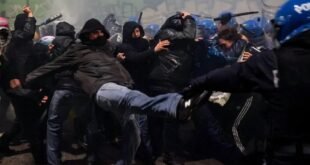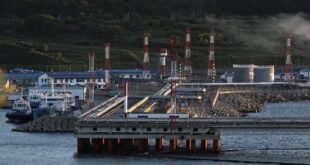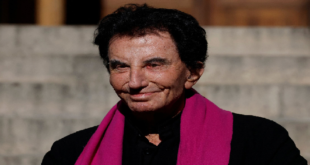15-12-2022
NAYPYIDAW: Htu Seng has spent the past decade defending the land and environment of her native Kachin State but it was only after the military seized power in a coup in February 2021 that she began fearing for her life.
 Forcibly relocated from her village near the river confluence known as Myitsone in 2011, to make way for a China-backed hydropower project that was suspended months later, she has since been at the forefront of efforts to ensure the multibillion-dollar project does not resume.
Forcibly relocated from her village near the river confluence known as Myitsone in 2011, to make way for a China-backed hydropower project that was suspended months later, she has since been at the forefront of efforts to ensure the multibillion-dollar project does not resume.
Over the past year and a half, however, the issue has been eclipsed by a more immediate threat: gold mining. The industry has cleared trees, eroded land and riverbanks, and polluted waterways with sediment and mercury across Myanmar’s north for the past two decades. Since the military coup, however, gold mining has reached unprecedented levels, local activists say.
At Myitsone, which forms the start of Myanmar’s longest river, the Ayeyarwady, the transformation of the landscape has been stark but while the planned hydropower project was met with the largest environmental protest movement in Myanmar’s modern history, Htu Seng is one of just a handful of people who have dared to speak out against gold mining at the same location.
They appealed to both the military and the Kachin Independence Organisation (KIO), which is fighting for autonomy and has also joined the country’s broader anti-coup movement, to order a halt to the mining. They have also released  public statements, given media interviews, and met local Christian leaders and other influential groups but the mining has continued and their activism has placed them in direct confrontation with the business interests of one of Kachin’s most prominent families, which has long benefitted from its ties to both the military and KIO to gain large concessions in logging and jade mining.
public statements, given media interviews, and met local Christian leaders and other influential groups but the mining has continued and their activism has placed them in direct confrontation with the business interests of one of Kachin’s most prominent families, which has long benefitted from its ties to both the military and KIO to gain large concessions in logging and jade mining.
So last December, when Htu Seng’s children discovered an anonymous letter in front of their house warning her to be careful and stop spreading “false information”, the message was clear.
While Htu Seng does not know who sent the threat, she has since been moving from place to place and reduced her public profile, Htu Seng is a pseudonym.
Still, she refuses to back down. “I have to be afraid of everyone right now,” she said “but if I stop speaking out due to fear, our home and land might disappear…That’s why I continue.”
The coup, ensuing military crackdowns and raging civil war have led to thousands of deaths and left more than a million people displaced. But a quieter crisis is also taking place as a collapsing formal economy, crumbling rule of  law and the proliferation of conflict create the perfect conditions for the further exploitation of Myanmar’s natural resources, not just gold but also rare-earth elements, jade and wildlife.
law and the proliferation of conflict create the perfect conditions for the further exploitation of Myanmar’s natural resources, not just gold but also rare-earth elements, jade and wildlife.
These industries were already weakly-regulated before the coup and mostly operated through illicit channels. Now, even the legality of existing permits or authority to enforce the law are in question while the National Unity Government, Myanmar’s anti-coup administration seeks international recognition as the country’s legitimate government and on the ground, armed resistance groups fight the military for territorial control.
The resource grab could have dire implications in a country that holds some of Southeast Asia’s largest intact forests and ecosystems and is ranked among the world’s most vulnerable and least-prepared for the impacts of climate change. It also further threatens the livelihoods and ancestral lands of a population that is nearly 70 percent rural. (Int’l Monitoring Desk)
 Pressmediaofindia
Pressmediaofindia




